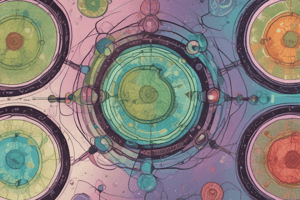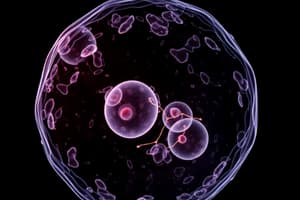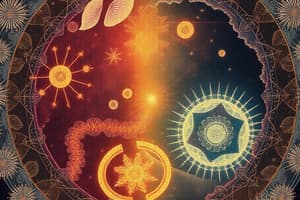Podcast
Questions and Answers
Which phase of the cell cycle is characterized by DNA replication?
Which phase of the cell cycle is characterized by DNA replication?
- S phase (correct)
- G2 phase
- G1 phase
- Prophase
During which stage of mitosis do sister chromatids separate and move towards opposite poles?
During which stage of mitosis do sister chromatids separate and move towards opposite poles?
- Prophase
- Metaphase
- Anaphase (correct)
- Telophase
What is the primary function of the G1 phase in the cell cycle?
What is the primary function of the G1 phase in the cell cycle?
- Preparation for mitosis
- Separation of sister chromatids
- DNA replication
- Cell growth and normal function (correct)
In which phase of mitosis do chromosomes align at the metaphase plate?
In which phase of mitosis do chromosomes align at the metaphase plate?
Which of the following is NOT a function of cell division?
Which of the following is NOT a function of cell division?
What event immediately follows telophase in animal cells?
What event immediately follows telophase in animal cells?
During which phase of mitosis does the nuclear membrane reform?
During which phase of mitosis does the nuclear membrane reform?
Which process is specifically associated with plant cell cytokinesis?
Which process is specifically associated with plant cell cytokinesis?
During which phase of mitosis do sister chromatids separate and move towards opposite poles of the cell?
During which phase of mitosis do sister chromatids separate and move towards opposite poles of the cell?
Which of the following best describes apoptosis?
Which of the following best describes apoptosis?
How does cytokinesis differ between animal cells and plant cells?
How does cytokinesis differ between animal cells and plant cells?
What are cyclins and cyclin-dependent kinases (CDKs) primarily involved in within the cell cycle?
What are cyclins and cyclin-dependent kinases (CDKs) primarily involved in within the cell cycle?
Which statement is true regarding the length of a cell cycle in different cell types?
Which statement is true regarding the length of a cell cycle in different cell types?
What happens to the nuclear membrane during prophase?
What happens to the nuclear membrane during prophase?
Which of the following is the correct sequence of stages in mitosis?
Which of the following is the correct sequence of stages in mitosis?
What is the main role of spindle fibers during mitosis?
What is the main role of spindle fibers during mitosis?
Which phase of the cell cycle involves cell growth and the absorption of nutrients?
Which phase of the cell cycle involves cell growth and the absorption of nutrients?
Flashcards
What is the cell cycle?
What is the cell cycle?
The cell cycle is a series of events that take place in a cell leading to its division and replication. This cycle consists of two main stages: interphase and mitosis.
What occurs during the interphase stage?
What occurs during the interphase stage?
Interphase is the stage where a cell grows, replicates its DNA, and prepares for mitosis. There are three sub-phases: G1, S, and G2.
What happens in G1 phase?
What happens in G1 phase?
G1 phase focuses on cell growth and normal function
What happens in S phase?
What happens in S phase?
Signup and view all the flashcards
What happens in G2 phase?
What happens in G2 phase?
Signup and view all the flashcards
What is mitosis?
What is mitosis?
Signup and view all the flashcards
What happens during the Prophase of mitosis?
What happens during the Prophase of mitosis?
Signup and view all the flashcards
What happens during the Anaphase of mitosis?
What happens during the Anaphase of mitosis?
Signup and view all the flashcards
What is cell division?
What is cell division?
Signup and view all the flashcards
How do you get bigger?
How do you get bigger?
Signup and view all the flashcards
When is cell division fastest and slowest?
When is cell division fastest and slowest?
Signup and view all the flashcards
Do cells divide forever?
Do cells divide forever?
Signup and view all the flashcards
Do all cells divide?
Do all cells divide?
Signup and view all the flashcards
What happens in interphase?
What happens in interphase?
Signup and view all the flashcards
What is prophase?
What is prophase?
Signup and view all the flashcards
What is cytokinesis?
What is cytokinesis?
Signup and view all the flashcards
What regulates cell division?
What regulates cell division?
Signup and view all the flashcards
Study Notes
Cell Cycle Overview
- The cell cycle encompasses interphase (growth and DNA replication) and mitosis (cell division).
- Interphase comprises three phases: G1 (growth and function), S (DNA replication), and G2 (preparation for mitosis).
Mitosis Stages
- Prophase: Chromatin condenses into chromosomes; nuclear membrane dissolves; mitotic spindle forms.
- Metaphase: Chromosomes align at the metaphase plate; spindle fibers attach to centromeres.
- Anaphase: Sister chromatids separate and move to opposite poles.
- Telophase: Chromosomes reach poles; nuclear membrane reforms around each set; chromosomes revert to chromatin.
Cytokinesis
- Cytoplasm divides, creating two distinct daughter cells.
- Animal cells: Contractile ring pinches the cell.
- Plant cells: Cell plate forms to create new cell wall.
Cell Cycle Functions
- Growth: Increased cell numbers form tissues and organs.
- Repair: Damaged cells are replaced.
- Reproduction (unicellular organisms): Cell division produces new organisms.
- Reproduction (multicellular organisms): Specialized cells (gametes) facilitate sexual reproduction.
- Maintain surface area-to-volume ratio: Crucial as cell growth increases volume faster than surface area.
- Differentiation: Specialized cells develop for specific tissue and organ functions.
Cell Cycle Duration
- Cell cycle durations vary depending on cell type.
- Examples: Mammal cell division (~12-24 hours), bacterial cell division (~20-30 minutes).
Cell Division Throughout Life
- Childhood: Cell division exceeds cell death.
- Adulthood: Cell division equals cell death.
- Later years: Cell division rate decreases below cell death rate.
Cell Cycle Regulation
- Cellular regulation with checkpoints ensuring accurate cell growth/division.
- Cyclins and cyclin-dependent kinases (CDKs) are key proteins regulating cell cycle progression.
Cancer
- Cancer arises when cells ignore regulatory signals, leading to uncontrolled growth.
- Carcinogens (cancer-causing substances) contribute to cancer development.
Studying That Suits You
Use AI to generate personalized quizzes and flashcards to suit your learning preferences.
Description
This quiz explores the intricacies of the cell cycle, focusing on interphase and the stages of mitosis. You'll learn about the phases involved, from growth to DNA replication, and how cytokinesis leads to the formation of daughter cells. Test your understanding of these fundamental biological processes.




